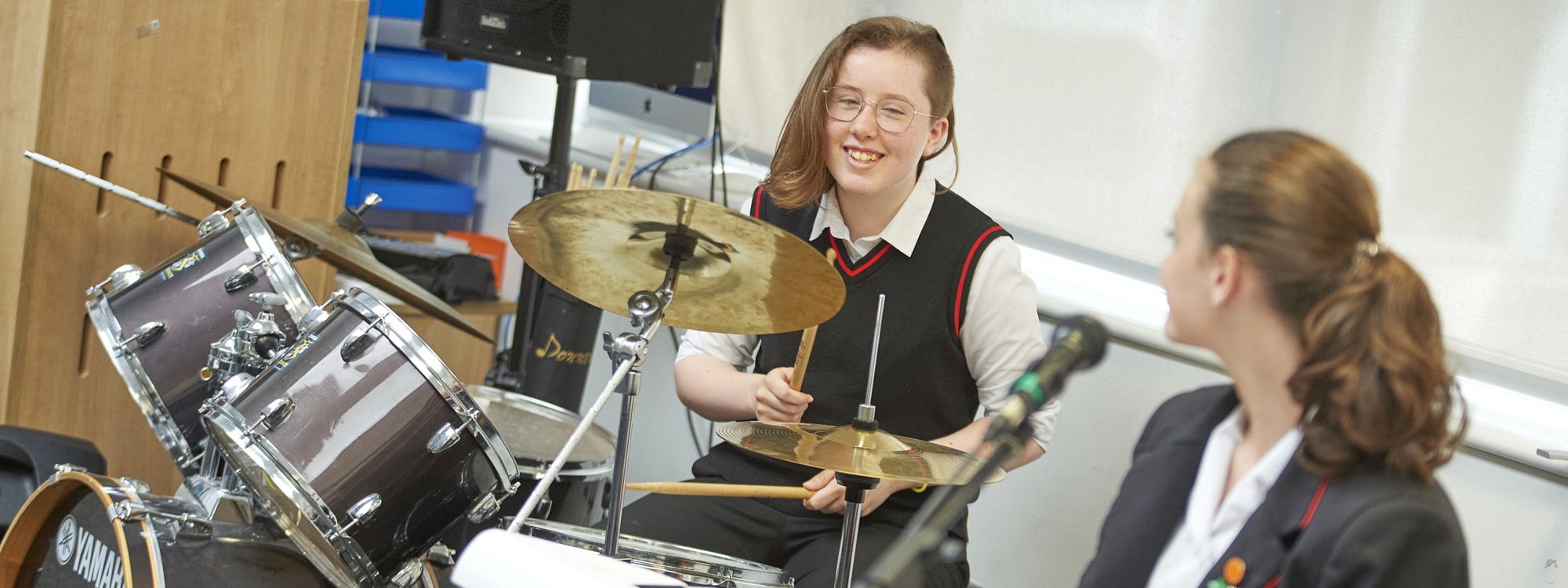Music
What is the intent of our Music Curriculum?
The music curriculum is broken up into three units, performance, composition and appraising. We implement this curriculum running multiple units concurrently. This is due to content and concept crossover between the units. For example, skills they pick up in appraising can be applied to their compositions. Similarly, as their performance skills develop such as knowledge of chords and rhythms, they can apply this to their appraising. We aim to build creative, determined and adaptable musicians who can take these skills into the modern musical world.
Co-curricular and Enrichment opportunities
- Rock band (Year 7 - 9)
- Ukulele Club (Year 7 - 11)
- Singing Club (Year 7 – 9)
- Music Theatre Trip (Year 9 & 10)
- Rock Band (Year 9-11)
Years 7, 8 & 9
MYP and Interdisciplinary learning (Years 7-9)
During MYP years (7-9) students explore performance through world music, composition through film music and appraising through music history. The music curriculum encourages independent thinking, developing creative ideas and responding to music listening. Global learning is embedded through the exploration of world-wide instruments, music artists and genres. What does your MYP curriculum encourage? Description of when and how global contexts are used within learning and how ATL skills and learner profile attributes are developed)
- Year 7 Units – Ukulele (Performance), Titanic Film Music Study (Composition), Music History (Theory + Performance).
- Year 8 Units – World Music (Performance), Independent Film Music (Composition), Popular Music (Performance)
- Year 9 Units – Cross – Curricular Puppetry Unit (Composition, Performance & Film Music)
Years 10 & 11
Course Title: Music
Exam Board: Eduqas WJEC
About the course
During Year 10, students may choose to study music at GCSE level at the Academy.
The GCSE EDUQAS Music course starts in Year 10 where students will further build upon their skill set from Key Stage 3 Music. Throughout the GCSE Music course, from Year 10-11, students will be working towards fulfilling the three examined components of the WJEC Eduqas GCSE in Music-
Component 1- Performing
30% of qualification
Total duration of performances: 4-6 minutes
- A minimum of two pieces, one of which must be an ensemble performance of at least one minute duration.
- The other piece(s) may be either solo and/or ensemble.
- One of the pieces performed must link to an area of study of the learner’s choice.
Component 2- Composing
30% of qualification
Total duration of compositions: 3-6 minutes
- Two compositions, one of which must be in response to a brief set by EDUQAS.
- Learners will choose one brief from a choice of four, each one linked to a different area of study.
- The second composition is a free composition for which learners set their own brief.
Component 3- Appraising
40% of qualification
Written examination: 1 hour 15 minutes
- This component is assessed via a listening examination.
- Eight questions in total, two on each of the four areas of study.
- Area of study 1: Musical Forms and Devices
- Area of study 2: Music for Ensemble
- Area of study 3: Film Music
- Area of study 4: Popular Music
How it is assessed
- Paper 1: Performance (Internal - 30%)
- Paper 2: Composition (Internal - 30%)
- Paper 3 : Appraising (External Exam - 40%)
For further information, click here.
Years 12 & 13: BTEC Level 3 National Extended Certificate in Music Performance
Course Title: BTEC Level 3 National Extended Certificate in Music Performance
Exam Board: Pearson
Qualification: BTEC Level 3 National Extended Certificate in Music Performance
About the course
The UK music industry helps to drive economic growth by creating jobs and opportunities for young people. The 2015 UK music survey ‘Measuring Music’ identified that the music industry supported more than 117,000 full-time jobs in the UK, of which 69,300 were professional musicians. The music industry contributed £4.1 billion to the UK economy, outpacing the overall growth of the economy by 2.5 per cent. In 2016, live music alone created £3.7 billion in direct and indirect income for the UK.
This course is for students wanting to continue their education through applied learning, and who aim to progress to higher education and ultimately to employment, possibly in the music sector or in the creative sectors as a whole. The qualification is equivalent in size to 1 A level and provides a coherent course of study covering both performance and the music industry. It is designed to be taken alongside other level 3 qualifications.
This course consists of three mandatory units and at least one optional unit. The mandatory units consist of one internal and two external.
The mandatory units, which provide an essential introduction to the skills and knowledge required to be successful in music. They cover the following topics:
- ensemble music performance (external)
- professional practice in the music industry (external)
- practical music theory and harmony.
The optional units have been designed to complement the knowledge and skills developed in ensemble music performance and support your progression to more specialist creative courses in higher education. They also link with relevant occupational areas. The optional units cover the following areas:
- solo performance







